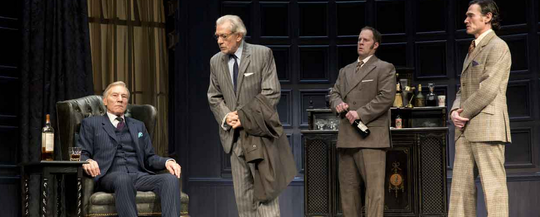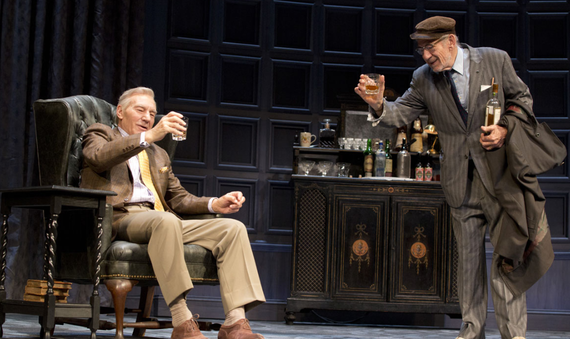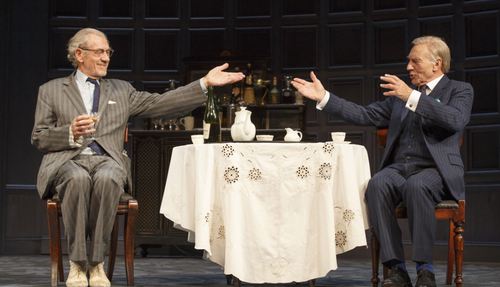
Patrick Stewart, Ian McKellen, Shuler Hensley and Billy Crudup, No Man's Land (2013)
photograph © Joan Marcus via www.mckellen.com
Two plays -- one I love, and one I've never liked -- are currently running in repertory on Broadway at the tiny jewel-box called the Cort Theatre: Samuel Beckett's Waiting for Godot, which I love, and Harold Pinter's No Man's Land, which I've never liked until now.
Both plays star the same actors. Ian McKellen and Patrick Stewart take the lead roles of Estragon/Spooner, and Vladimir/Hirst, while Billy Crudup and Shuler Hensley do double duty as Lucky/Foster and Pozzo/Briggs. However, I'm only talking about No Man's Land here, since I decided to go at the last minute on a rainy Thursday, and not expecting particularly to enjoy, and certainly not to feel, the play.
No Man's Land is about poetry and aging, wealth and poverty, grace and menace, reality and illusion and confusion. In it, a wealthy, successful poet in his sixties, Hirst, brings to his posh home a man of the same age, Spooner, who he's met on Hampstead Heath. Poor Spooner would have been well off to have stayed on the wild, open Heath, where he loves to walk because it does not cost anything, and where he may (or may not) work sometimes at a pub, and where he may (or may not) be inspired to write poetry. The promise of a rich acquaintance, a whiskey, and intelligent conversation -- in that order -- lead Spooner home with Hirst, where darkness and stasis and intimations of worse prevail. Hirst's life is fantasy to a large degree, and Spooner plays along -- pretending to be an old Oxford chum, someone who's shared girlfriends with him, a fellow poet. However, Hirst's two servants, the bulky, menacing Briggs and the "vagabond cock" Foster, destroy the rapport (even if false) of their elders and have their claws sunk into control of the play in the end. No Man's Land is no country for old men -- nor for women. For all the talk of Siamese girls and wives in the country and Home Counties sisters-of-friends, there are no women characters to be abused as there often are in Pinter (see, e.g., Emma in Betrayal). It's a bleak, disturbing, sometimes violent and scary play.
The only other time I've attempted No Man's Land, I saw it in London a few years ago with a similarly spectacular cast, including Michael Gambon as Hirst. It tired me, and above all it didn't move me. Pinter generally makes me think, makes me laugh, makes me angry, and leaves me cold. This is no longer true, thanks entirely to the actors in the current Broadway production.

Stewart and McKellen, photo © Joan Marcus via www.mckellen.com
From the very beginning, I was surprised to feel both interested, and curious, as to the welfares of the characters, even though I knew already what would befall them. Ian McKellen made this happen. McKellen, in his once-good gray striped suit, battered fisherman's cap, and dirty plimsolls, begins the play with his back to the audience, while Stewart, playing host, is in charge of the whiskey bottle. As he talks to his new (or perhaps his old) friend, McKellen balances restlessly on flatly-placed feet, his big hand tucked nervously behind his back, fingers spread. McKellen is a remarkably physical actor. Once upon a time I saw him silence an audience at the Kennedy Center by the way he, playing Richard III, maneuvered with one hand a huge silver candelabra to light a cigarette. Another time, I saw him set a sedate London West End audience into shrieks and wolf whistles and a mid-play standing, jumping-up-and-down ovation by the way he walked onstage, as Widow Twankey in Aladdin, wearing fishnet stockings on quite shapely legs. McKellen moves throughout this play like a cat -- not a scatty, twitchy housecat, but a big roving creature with wide noticing eyes. When he spins a pencil in his hand and paws it back into a pocket, or juggles a bottle and glasses softly, without spilling a drop or clinking a glass, or crosses all the way downstage, carefully light on his toes, it's like watching a lion samba.
Stewart is as frozen as McKellen is mobile. His tight control, both physical and verbal, onstage makes him an ideal Hirst. Years ago, I saw him as Othello in what critics called Michael Kahn's "photo-negative" production (Othello was played by a white actor; the rest of the cast were African-American actors) at the Shakespeare Theatre in Washington, D.C. He was excellent as Othello, a career military leader surprised, and derailed, by jealous love. Likewise, in Macbeth a few years ago at the Brooklyn Academy of Music, Stewart played the Scottish king as a rigid and determined man amazed and enraged by events and people spinning out of his control. Hirst is a hard little man, immaculate in his polished shoes and bespoke suits. When his toupee falls sadly toward the floor as he crawls drunkenly for the door, his shiny shoes now reversed to show their worn soles, Stewart's body conveys the transformation breathtakingly.
That the two actors are friends informs and shapes this production marvelously. McKellen's gentleness and yearning, his desire to please which becomes, by the play's end, a desire to survive are encouraged, and complemented, by Stewart's difficult Hirst, at one moment convivial, at the next silent and dismissive. When in Act One the two old men reminisce about cottages they may (or may not) have had, where they gave their visitors tea on the lawn, and Spooner laments, "What happened to them? What happened to our cottages? What happened to our lawns?" I knew, as a critic, that Pinter is making a point about class. He's mocking their past, the "memory of the bucolic life" and an England with cottages and village churches and lawns. Intellectually, I knew all this. Yet as I listened to McKellen speaking, and Stewart responding first with gentility and then with increasing hostility, all the way to Hirst's thrown drink glass and his line "Tonight...my friend...you find me in the last lap of a race...I had long forgotten to run," I began to cry. Even when McKellen's immediate riposte -- "A metaphor. Things are looking up" -- made me laugh, the tears stayed close for the rest of the play.
Snapping around the circle of Hirst's living room, the only set for the play, are Billy Crudup and Shuler Hensley. Crudup's Foster is an edgy young man no longer so young, still a pretty boy, though, to an old man. He is Hirst's secretary, housekeeper, chauffeur and, as he says grandly, "amanuensis." Hensley's Briggs bluntly speaks the truth in this play of illusion and misremembering, calling Foster a "neurotic poof" and worse, and Spooner a "shithouse operator" and worse. Both Crudup and Hensley are terrifying in quite different ways. Foster would laugh and look beautiful as he knifed you, while Briggs would crush you and never look back.
Productions like this don't come along often, not even in New York, where good shows are regularly on Broadway, and off and off-off and all around the town. Please do go. Harold Pinter is having a good year on Broadway, with a marquee Betrayal (starring Daniel Craig and Rachel Weisz as a husband and wife) as well as this No Man's Land. I've seen both, and will be returning in two weeks to see No Man's Land again. It's not to be missed, this small, intense and bitter play written large right now in New York because of the performances in it.
McKellen and Stewart, photo © Joan Marcus via www.mckellen.com
